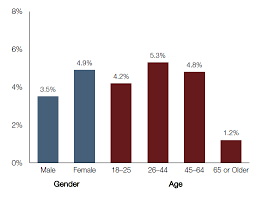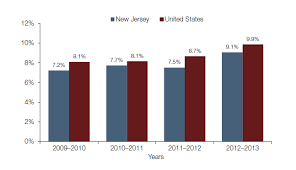Helping Those With Mental Illnesses in Mercer County
Nicholas Nower
May 27, 2019
Mental Illness is an unfortunate reality for a great number of people. As a matter of fact, 1 in 5 people can tell you that they have experienced a mental illness at some point, and say how much it has affected their lives. Nobody’s story is the same - all mentally ill people cannot be judged in one way. Thankfully, no matter how badly a person is affected, there are various ways to treat, cope, and overcome mental illnesses. To truly understand mental illnesses, one has to understand how widespread it is, and know how to find help, either for themselves or for a close one, and how to be an advocate.
Mercer County has a population of 371,527 residents, making it the 12th most populated county of the 21 in New Jersey. It has slightly more women than men, and is the home to more than 17,000 veterans. Around 11% lives below the poverty line.
Of its population of 371,527 people, approximately 74,300 are suffering from a mental illness in Mercer County, which is calculated using the 1 in 5 figure for the average amount of people dealing with mental illness in an area. While this number is not significantly high for this county’s given population, it still shows that a great portion are still suffering, and that they should not be ignored. These statistics were calculated by the Mercer County Division of Mental Health (belonging to the Mercer County Department of Human Services), which aims to research mental illnesses, how widespread they are, and how they can be treated. This Division uses statistics pertaining to all of the US to get an idea of what the situation is like in Mercer County. From their data, they found that among the 20 million adults with a substance abuse disorder, 40.7% (8.4 million) of those adults also have mental illnesses, which shows a significant link between the two. When researching how many adults deal with different mental illnesses, they found that 1.1% of adults have schizophrenia, 2.6% have a bipolar disorder, 6.9% have had a depressive episode in the last year, and around 18% have had to deal with anxiety at some point in their lives. 18 to 22 veterans commit suicide everyday, and among children, 90% of those who have committed suicide also had a mental illness. As shown in the graph below, there are more women than men who are reported to have had mental illnesses in 2013, and adults over 65+ are much less likely to say they are mentally ill than adults younger than them.
A related finding is that women are more likely than men to seek help for their mental illness. However, something to note here is that this data could be skewed by the fact that affected men are less willing to admit to their illness, due to many men feeling the need to be “tough” and not show weakness. While more adolescents have mental illnesses than adults, they are also less likely to seek help, most likely due to the lack of resources in schools or stigma among teenagers, showing the importance of mental health awareness in schools. Income levels are also a factor in the likelihood of having a mental illness, as the Mercer County Division of Mental Health found that “In 2013, the percentage of adults who had serious thoughts of suicide was higher among those without health insurance and those living in households whose income was less than 100% of the Federal Poverty Level (FPL). There were no differences in suicidal thoughts between adults who lived in metropolitan areas and those who lived in nonmetropolitan areas” (14). In New Jersey, the amount of adults dealing with serious mental illness (SMI) and adolescents dealing with major depressive episodes (MDE) are very similar to the national average, which fortunately shows that mental illness is not an even worse of an issue in this state.
Some people in Mercer County dealing with a mental illness might feel like they have nowhere to go. In Trenton, specifically, many mental health wards have shut down, due to the lack of funding and infrastructure. According to the Great Mercer Public Health Partnership (or GMPHP), one person stated in a discussion on community improvement that due to the Trenton Psychiatric Hospital closing, there was “an influx of mentally ill at libraries since they are a safe haven with a roof... This is the only place to possibly find access to information about care. Their needs are not being met.” However, those today suffering from mental illness in Mercer County thankfully do not have to feel alone, because there are various resources that help spread awareness for mental illness and for those affected to find help. For particularly traumatic events, the Mercer County Division of Mental Health provides “Psychological First Aid.” This is given “in the immediate aftermath of traumatic event that involves loss, injury, and/or violence,” as stated by the Division. Through extensive therapy and services, the Division is able to help traumatized individuals recover and return to a normal life.
Another mental health program that is actively present in Mercer County is the National Alliance on Mental Illness, or NAMI for short. Given their active presence, they respond quickly to calls or emails made to their helpline: 609.799.8994 x17. They also provide several group activities such as the “Overcoming Social Anxiety Workshop” and the “Intensive Family Support Services.” However, NAMI contributes far more to helping those with mental illnesses by spreading awareness. One way NAMI does so is through a program called “Family-to-Family.” For no charge, the family members and friends of those with mental illnesses (as well as mentally ill people themselves) are able to attend a 12-session education program that teaches about various mental health conditions and how to treat them. The goal of this class is to help people become advocates of mental illness and maintain their own mental health, so that they can understand and help those who have it without having the illness themselves. Provided every spring and fall, “Family-to-Family” teachers provide information based on their own personal experiences, making it a very evidence based program. Michelle Zechner, a pupil of these classes, says “Family-to-Family teaches a new way of being. Blame and shame are taken away. We teach people to rely on each other by building a sense of community.” Another program that NAMI provides is “Ending the Silence,” which is interactive activity that takes places in middle and high schools, and aims to get rid of the stigma attached to mental illness. In this program for students, staff, and parents all alike, presenters share their stories of how they navigated life with their mental illnesses, how they learned to cope with it, and how others can find support. This program is reported to be very successful because the audience doesn’t just learn about mental illnesses, but they also get to interact with an actual person who has dealt with those illnesses and is willing to share their stories. This is emphasized in a statement by Nicolas Rüsch.
“Contact with persons with mental illness may help to augment the effects of education on reducing stigma. Research has shown that members of the majority who have met minority group members are less likely to stigmatize against members of this minority.”
—Rüsch
Works Cited
"Mental Health Plan." Department of Human Services, Division of Mental Health, July 21, 2015, http://www.mercercounty.org/home/showdocument?id=5288
"Family-to-Family." National Alliance on Mental Illness, (n.d.), https://namimercer.org/learn-more/family-to-family/
"Ending the Silence." National Alliance on Mental Illness, (n.d.), https://namimercer.org/learn-more/family-to-family/
"Mental illness stigma: Concepts, consequences, and initiatives to reduce stigma." European Psychiatry, December 2005, https://www.europsy-journal.com/article/S0924-9338(05)00090-8/fulltext#back-bib1
"Mercer County 2018 Community Health Assessment." Greater Mercer Public Health Partnership, (n.d.), https://health.montgomery.nj.us/wp-content/uploads/2018/10/GMPHP-CHA-DRAFT_092118.pdf





Leave a comment
You must be logged in to post a comment.